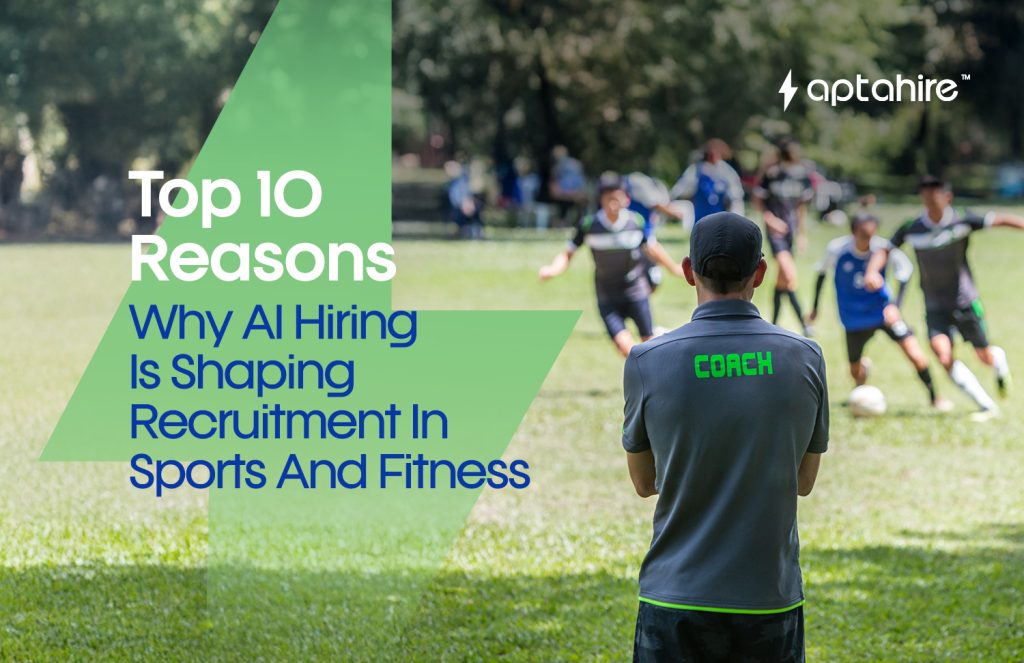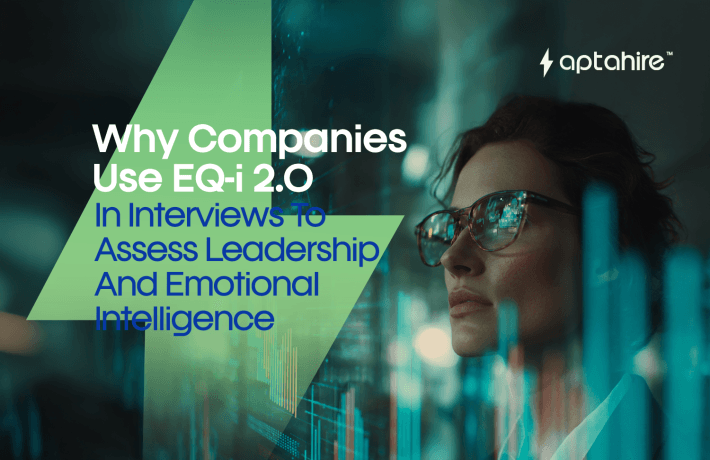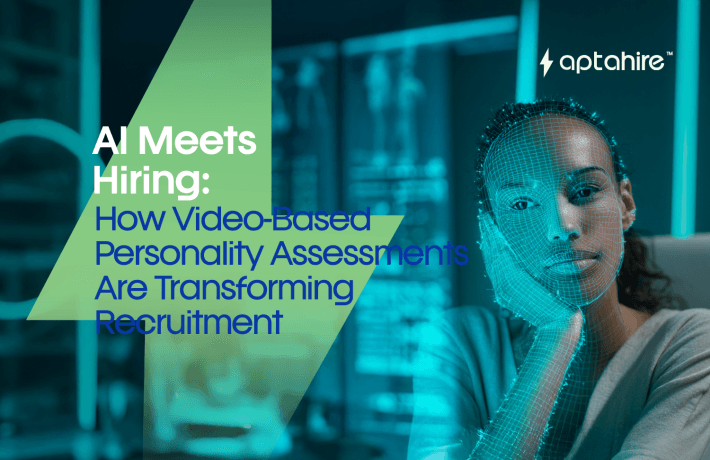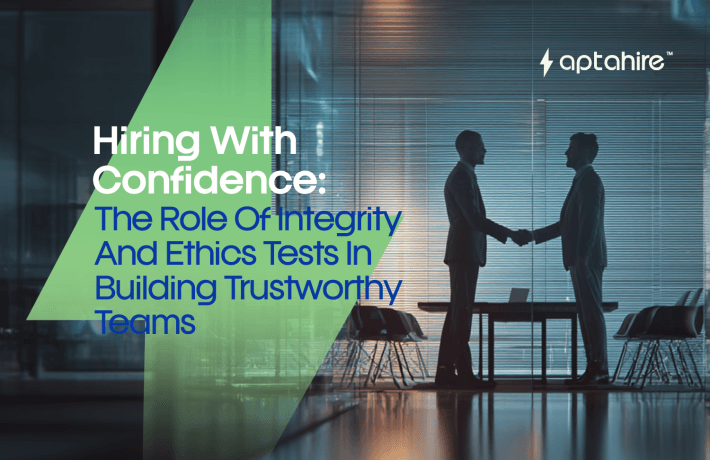Top 10 Reasons Why AI Hiring is Shaping Recruitment in Sports and Fitness

Introduction
Let’s face it, the sports and fitness industry isn’t just about athleticism anymore. Behind every star athlete, top-tier coach, or booming fitness brand is a solid strategy that’s increasingly driven by data and tech. One of the most game-changing developments? AI-powered hiring.
Whether you’re recruiting a performance coach, a digital fitness strategist, or a physiotherapist for an elite team, AI is transforming how talent is sourced, screened, and selected. It’s not just faster. It’s smarter, more accurate, and better aligned with the evolving needs of this dynamic industry.
So, how exactly is AI shaking up recruitment in sports and fitness? Here’s a closer look at ten key ways it’s making a real difference.
1. Smarter Ways to Spot Specialized Talent
Hiring for sports and fitness isn’t your average recruitment gig. You’re not just looking for generalists, you’re after specialists. Think: a conditioning coach who’s also fluent in data analysis, or a nutritionist who understands wearable tech. With AI, recruiters can scan massive datasets, resumes, and certifications to match candidates with very specific role requirements. These tools can even identify skills that are just starting to trend in training science or recovery tech, giving you a competitive edge.
2. Speeding Things Up When Time’s Ticking
Let’s say your sports club is about to kick off a season or a fitness brand is launching a new facility. You need top talent, fast. AI cuts down the hiring timeline significantly by automating tedious tasks like resume screening, qualification checks, and even first-round interview scheduling. This lets teams focus on evaluating quality candidates while AI handles the rest behind the scenes.
3. Predicting How Someone Will Actually Perform
This is where AI really shines. It doesn’t just look at a candidate’s past experience, it analyzes performance data, behavioral patterns, and even biometric inputs to help predict how they’ll perform in a specific role. Let’s say you’re hiring an assistant coach. AI can run simulations or behavioral assessments to gauge their communication style, leadership ability, and decision-making under pressure.
4. Getting a Read on Physical and Mental Readiness
Fitness and sports demand a unique blend of physical endurance and psychological resilience. AI tools can assess a candidate’s stress levels, emotional intelligence, and response speed during a video interview. It does this by analyzing everything from tone of voice to micro facial expressions, helping you understand the person behind the resume.
5. Finding the Right Fit for Non-Playing Roles Too
The back-end of the sports industry is just as important as the frontlines. You’ve got analysts, content creators, physiotherapists, sales teams, event planners, the list goes on. AI tools help sort through candidates based on soft skills, adaptability, and domain expertise, making sure even the support crew fits seamlessly into your ecosystem.
6. Recruiting Beyond Borders
With virtual coaching and remote fitness platforms on the rise, there’s no reason to limit yourself to hiring locally. AI tools help you find talent anywhere in the world and evaluate them just as effectively as in-person candidates. This is especially useful for boutique fitness startups or sports academies that need international expertise but don’t have time for lengthy hiring cycles.
7. Hiring Without Bias Getting in the Way
The sports and fitness world is diverse, and your hiring process should reflect that. AI helps by anonymizing resumes and assessments, removing any bias linked to gender, ethnicity, or background. These systems also flag biased language in job descriptions and recommend inclusive alternatives, helping your brand attract a broader range of qualified candidates.
8. Keeping a Warm Bench of Talent Ready
Why start from scratch every time you have an opening? With AI-driven candidate relationship tools, you can build a proactive pipeline. These systems keep track of passive candidates, send reminders to re-engage them, and even suggest the best times to reach out. So when the need arises, you’re not scrambling, you’re already halfway there.
9. Staying on Top of Certifications and Compliance
In this industry, credentials matter. Whether it’s CPR certifications, coaching licenses, or anti-doping compliance, AI systems can keep track of it all. They’ll validate documents, flag expired ones, and even send reminders when something’s up for renewal. It reduces admin work and ensures you’re always audit-ready.
10. Planning for Future Roles You Haven’t Thought of Yet
The fitness landscape is evolving quickly. New roles like virtual fitness instructors, AI-based performance analysts, and athlete brand managers are becoming more common. AI hiring platforms use trend forecasting to help you anticipate what talent you’ll need down the line, so you’re not just hiring for now, but for what’s coming next.
Stats You’ll Want to Know
According to McKinsey, organizations using AI in hiring processes cut their time-to-hire by up to 40 percent. More impressively, these companies also saw a 25 percent improvement in candidate quality. In the sports tech niche, investment in AI tools is growing at about 30 percent each year. And if you’re in the fitness startup space, know this, over 60 percent of new brands are already leaning on AI to scale faster and smarter.
Tips and Tricks for Using AI in Hiring Smarter
- Choose AI tools that are transparent about how they assess and score candidates.
- Use AI as a first filter, but follow it up with in-person or trial-based evaluations.
- Don’t just focus on hard skills. Use AI to screen for traits like leadership and empathy too.
- Regularly audit your AI systems to make sure they’re not introducing hidden biases.
- Pick platforms that also offer compliance tracking and document validation.
A Few Things You Might Not Know
- Some national sports bodies are using AI to analyze how physiotherapists interact with athletes, cutting down selection processes from months to weeks.
- AI can evaluate video footage of a coach’s training session to assess their communication style and strategic thinking.
- Fitness brands are using AI to find influencer candidates who naturally align with their values, based on audience sentiment, not just follower count.
Final Thoughts
The real power of AI in recruitment isn’t just in its speed or efficiency. It’s in the quality of insight it brings to the table. In sports and fitness, where the difference between winning and losing is often razor-thin, having the right people in the right roles is everything.
AI helps hiring teams move beyond gut feelings to make informed, consistent, and forward-thinking decisions. It doesn’t replace human judgment, it strengthens it. As tech, health, and sport continue to intersect, AI will be essential to building teams that aren’t just good today, but prepared for tomorrow.
For those in sports and fitness who want to stay competitive, it’s no longer a question of “if” you should adopt AI hiring, but “how soon.”
FAQs
1. How is AI used in hiring within the sports and fitness industry?
AI is used to automate and improve hiring processes such as resume screening, video interview analysis, talent matching, and predictive performance evaluations for both frontline and support roles across the industry.
2. Can AI help in hiring roles beyond athletes and coaches?
Absolutely. AI helps recruit for a wide range of roles including physiotherapists, sports nutritionists, marketing executives, data analysts, operations managers, and even remote fitness consultants.
3. How does AI assess a candidate’s physical or mental readiness?
AI tools use video analysis and cognitive assessment techniques to evaluate speech, facial expressions, and decision-making abilities, offering insights into emotional intelligence, resilience, and mental sharpness.
4. Is AI-based recruitment biased or fair?
When designed responsibly, AI reduces hiring bias by anonymizing candidate data, removing identifiable details, and ensuring objective evaluation criteria, supporting more inclusive and diverse hiring.
5. Can AI predict future job roles in the sports and fitness sector?
Yes. AI analyzes market and tech trends to forecast emerging roles like wearable tech consultants or virtual fitness trainers, helping organizations stay ahead with strategic workforce planning.
6. How does AI speed up hiring during peak seasons or tournaments?
AI automates time-consuming tasks like shortlisting resumes, scheduling interviews, and verifying credentials, reducing time-to-hire by as much as 40% during busy recruitment periods.
7. What are the benefits of using AI for remote or hybrid hiring?
AI removes geographic barriers, allowing companies to find the best talent worldwide for virtual roles like online coaches, fitness content creators, or remote analysts, without compromising quality.
8. Is AI a replacement for human recruiters in sports and fitness?
No. AI is a complement, not a replacement. It supports recruiters with data-driven insights, enhances decision-making, and streamlines operations, but human judgment remains essential for final hiring calls



